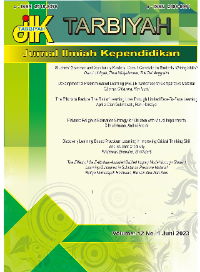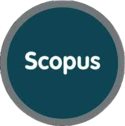The Efforts to Reduce The Risk of Learning Loss Through Limited Face-To-Face Learning
DOI:
https://doi.org/10.18592/tarbiyah.v12i1.8874Keywords:
distance learning, learning loss, limited face-to-face learningAbstract
The Covid-19 virus disease gap has caused a lot of problems, such as a significant decline in learning patterns ini educational institutions to the non-maximal implementation of online learning as a result, new problems aries, one of which is learning loss. This research was conducted to describe how the efforts of the MAN 1 Ngawi educational institution in minimizing the risk of learning loss that arises in distance learning through the application of limited face-to-face learning patterns. The method used by the author in this study is a qualitative concept in which the data obtained through the interview and observation process. This article tries to describe how the efforts of educational institutions at MAN 1 Ngawi to reduce the risk of learning loss that arise in distance learning through the application of the limited face-to-face learning (PTMT) pattern. The implementation of this PTMT gives great hope to the world of education in facing the curret pandemic, namely to improve the quality of the quality of educational institutions and restore student interest in learning which is slowly disappearing due to the distance learning gap through new habit patterns in implementing limited face-to-face learning.References
Akhyak. (2021). Efektifitas Pembelajaran Selama Pelaksanaan PTMT. Akademia Pustaka.
Andriani, W., Subandowo, M., Karyono, H., & Gunawan, W. (2021). Learning Loss dalam Pembelajaran Daring di Masa Pandemi Corona. Prosiding Seminar Nasional Teknologi Pembelajaran Universitas Negeri Malang, 1(1), 485–501. http://snastep.com/proceeding/index.php/snastep/index
Angrist, N., de Barros, A., Bhula, R., Chakera, S., Cummiskey, C., DeStefano, J., Floretta, J., Kaffenberger, M., Piper, B., & Stern, J. (2021). Building back better to avert a learning catastrophe: Estimating learning loss from COVID-19 school shutdowns in Africa and facilitating short-term and long-term learning recovery. International Journal of Educational Development, 84(March), 102397. https://doi.org/10.1016/j.ijedudev.2021.102397
Ansori, A., & Sari, A. F. (2020). Inovasi Pendidikan di Masa Pandemi Covid-19. Jurnal Literasi Pendidikan Nusantara, 1(2), 133–148. http://jurnal.uinbanten.ac.id/index.php/jlpn/article/view/3735
Ariantini, N. (2020). Kompetensi Guru Bk Multikultural Perbatasan Dalam Mitigasi Learning Loss: Inovasi Layangan Bimbingan dan Konseling Berbasis Nilai-nilai Kearifan Lokal di Era Disrupsi. Seminar Nasional Virtual Konseling Kearifan Nusantara (KKN) 2 dan Call for Papers, 151–156.
Bennett, N., & Lemoine, G. J. (2014). What a difference a word makes: Understanding threats to performance in a VUCA world. Business Horizons, 57(3), 311–317.
Dikdas, G. (2021). Agar Terhindar Dari Learning Loss, Sekolah Wajib Berikan Opsi Belajar Tatap Muka Terbatas. Direktorat Guru Pendidikan dasar, 1. https://gurudikdas.kemdikbud.go.id/news/Agar-Terhindar-Dari-Learning-Loss,-Sekolah-Wajib-Berikan-Opsi-Belajar-Tatap-Muka-Terbatas
Fitriansyah, F. (2022). Dinamika Pembelajaran Tatap Muka Terbatas Di Kalangan Mahasiswa. Prima Magistra: Jurnal Ilmiah Kependidikan, 3(1), 123–130.
Haris, A., Sentaya, I. M., & Sulindra, I. G. M. (2022). Keterampilan Guru Abad 21 Dalam Mengurangi Learning Loss Pada Peserta Didik ( Kajian Fenomenalogis Di Sma Kabupaten Sumbawa ). Jurnal Ilmiah Mandala Education (JIME), 8(1), 1–11.
Kemendikbud. (2021). Keputusan Bersama Menteri Pendidikan Dan Kebudayaan, Menteri Agama, Menteri Kesehatan, Dan Menteri Dalam Negeri Republik Indonesia Nomor 03/KB/2021 Nomor 384 Tahun 2021 Nomor HK.01.08/MENKES/4242/2021 Nomor 440-717 Tahun 2021 Tentang Panduan Penyeleggaraa. In Kemendikbud (23 425/ A5 /aK. Ol. 0 4/ 202L; Nomor 021). https://www.kemdikbud.go.id/main/blog/2020/08/protokol-kesehatan-ketat-untuk-sekolah-tetap-muka-di-zona-hijau-dan-kuning
Miles, M. B., Hubberman, A. M., & Saldana, J. (2014). Qualitative Data Analysis, A Methods Sourcebook, Terj. Tjetjep Rohindi Rohidi (3 ed.). UI Press.
Ngawi, D. P. P. K. (2021). Surat Edaran Pelaksanaan Pembelajaran Tatap Muka Terbatas (420/1072/404.101/2021).
Nissa, S. F., & Haryanto, A. (2020). Implementasi Pembelajaran Tatap Muka Di Masa Pandemi Covid-19. Jurnal IKA PGSD (Ikatan Alumni PGSD) UNARS, 8(2), 402. https://doi.org/10.36841/pgsdunars.v8i2.840
Pratama, R. (2019). Pengembangan Media Pembelajaran Blink Solar System (B-SOS) pada Pembelajaran Tata Surya bagi Peserta Didik Tunanetra di SLB Negeri A Kota Bandung. Universitas Pendidikan Indonesia.
Pratiwi, W. D. (2021). Dinamika Learning loss : Guru dan Orang Tua. Jurnal EDUKASI NONFORMAL, 1(1), 147–153.
Rahman, A., Habibi, M., Zaman, A. N., & Sahrul, M. (2021). Edukasi Kebijakan Organisasi Adaptif di Era VUCA pada Pimpinan Cabang Ikatan Pelajar Muhammadiyah Leuwiliang Bogor. E-DIMAS: Jurnal Pengabdian kepada Masyarakat, 12(3), 542–548.
Rhamdan, D., Kule, A., & Al Wahid, S. M. (2021). Analisis Pemanfaatan e-Learning di Masa Pandemi (Studi Kepustakaan: Learning Loss pada Peserta Didik). Jurnal Pendidikan Dan Kewirausahaan, 9(2), 432–446. https://doi.org/10.47668/pkwu.v9i2.263
Rusmini. (2017). Metode Penelitian: Teori dan Aplikasi Penelitian Kualitatif, Kuantitatif, Mixed Methods Serta Research dan Development. Pustaka Jambi.
Sabates, R., Carter, E., & Stern, J. M. B. (2021). Using educational transitions to estimate learning loss due to COVID-19 school closures: The case of Complementary Basic Education in Ghana. ELSEVIER: International Journal of Educational Development, 82(January), 1–10. https://doi.org/https://doi.org/10.1016/j.ijedudev.2021.102377
Safitri, A., & Astuti, J. (2019). Keefektifan Pembelajaran Jarak Jauh. Jurnal Pendidikan Universitas Muhammadiyah Kendari, 1(1), 1–19.
Salim & Syahrum. (2007). Metodologi Penelitian Kualitatif: Konsep dan Aplikasi dalam Ilmu Sosial, Keagamaan, dan Pendidikan. Cita Pustaka Media.
Sovayunanto, R. (2022). Learning Loss Dan Faktor-Faktor Penyebab Di Sekolah Menengah Pertama (Smp). Jurnal Mahasiswa BK An-Nur : Berbeda, Bermakna, Mulia, 8(1), 12. https://doi.org/10.31602/jmbkan.v8i1.6001
Sukmawati, A. D., & Mustofa, Z. (2022). Developing Self Awareness of Students in Religious Education to Reduce the Risk of Learning Loss in the Era of the Covid-19 Pandemic. Proceeding of the 3 th International Conference on Islamic Studies (ICIS), 3, 357–369.
Tarakarti Gusman, D., Wati, W., & Bulan Lageni, I. (2022). Sosialisasi Dampak Positif Penggunaan Gadget Bagi Siswa. Journal UMJ, 1–2. http://jurnal.umj.ac.id/index.php/semnaskat
Tasniwati. (2021). Implementasi Blended Learning Dalam Pembelajaran PAI di MAN 4 Pasaman Barat Pada Masa Covid-19. Profetika Jurnal Studi Islam, 1–14. https://journals.ums.ac.id/index.php/profetika/article/view/14764
Ubaidillah, M. (2019). Penerapan Flipped Classroom Berbasis Teknologi Informasi pada Mata Pelajaran Fiqih di MTs Al-Chusnaniyah Surabaya. Islamika : Jurnal Ilmu-Ilmu Keislaman, 19(01), 34–45. https://doi.org/10.32939/islamika.v19i01.375
Verawati & Desprayoga. (2019). Solusi Pembelajaran 4.0: Hybrid Learning. Seminar Nasional Pendidikan Program Pascasarjana Universitas PGRI Palembang, 2, 999–1015. https://jurnal.univpgri-palembang.ac.id/index.php/Prosidingpps/article/download/2739/2549
Vhalery, R., Setyastanto, A. M., & Alfilail, S. N. (2021). Pembelajaran Berbasis Online “Zoom” Pada Kesiapan Belajar Mahasiswa Di Masa Pandemi Covid-19. Research and Development Journal of Education, 7(1), 215. https://doi.org/10.30998/rdje.v7i1.9329
Widyaningtyas, A., Sukarmin, & Radiyono, Y. (2013). Peran Lingkungan Belajar Dan Kesiapan Siswa Kelas X Sekolah Menengah Atas Negeri 1 Pati. Jurnal Pendidikan Fisika, 1(1), 136–143.
Downloads
Published
How to Cite
Issue
Section
License
Authors retain copyright and grant the journal right of first publication with the work simultaneously licensed under a Creative Commons Attribution 4.0 International License that allows others to share the work with an acknowledgment of the work's authorship and initial publication in this journal.




